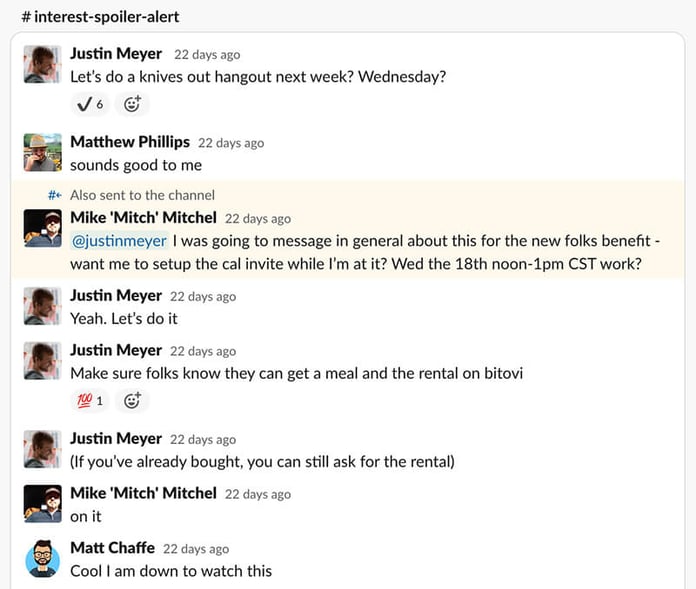Bitovi has been a remote-only company for ten years. A few of our clients have asked how to foster culture, community and communication in a remote organization.
For those not used to work from home (WFH), it might seem like it's the same thing as office work in a more comfortable setting. However, there are subtle differences that slowly introduce problems to a team culture.
1. Lack of "water cooler" moments.
2. An aversion to gathering at all, since it's more difficult to get together compared to an office setting.
3. Chat tools like slack cause an "always on" communication style that can be disruptive and unorganized.
The following are three concrete suggestions to address these problems (that Bitovi actually does):
- Periodic non-tech events
- Periodic recognition and information events
- Promote using forums instead of Slack
Tip 1 - Periodic non-tech event(s)
At Bitovi, we have an #interest-spoiler-alert slack room where we talk about movies or TV. We pick a movie or TV show and then plan a lunch. To encourage attendance, Bitovi covers:
- The cost of watching the show (for example, an iTunes rental or a month of Netflix).
- The cost of lunch (delivered or carryout)
At lunch, we talk about what we like and don't like about the movie. Eventually, the conversation turns to recommendations for other shows.

Tip 2 - Periodic recognition and information sharing events
At Bitovi, we have a meeting every six weeks where we recognize people's successes and share information about Bitovi's direction, goals, etc.

The following is the format for the 1-hour meeting:
- 0:00 - Talk about "wins"
- Before the meeting, we ask Bitovians to submit positive things other Bitovians have done. We share these for the first 10 minutes. Many of the "wins" are not business-related. For example, Marriages, new pets, and new houses are "winning".

- 0:10 - Give a status update
- Departments at Bitovi (Sales, Open Source, Consulting, HR) each give an overview of what they have accomplished in the last six weeks, their KPIs, and their plans for the next six weeks.
- 0:30 - New hire introductions
- Each new hire prepares a 5-minute presentation that highlights their:
- hobbies
- work experience before Bitovi
- pets / family
- anything else fun about them

- 0:45 - Open forum
- I stick around for the rest of the hour to talk about whatever is on people's minds.
Tip 3 - Promote using forums instead of Slack
Many people think that Slack is all they need to transition from in-person to remote work. It is not.
In-person teams can ask people questions face to face.
While face to face communication can be disruptive, it at least allows us to perceive if our questions might be disruptive. If you can see another person is concentrating, you might send an email instead of walking up to them.
Imagine turning off our perception of other people ... this is the problem with Slack. Slack is so good at chat that it creates too much noise. Sending messages is cheap, so everything happens through chat. Chat is both disorganized and disruptive.
I am not recommending ditching Slack. It's a great product. Instead, I recommend establishing communication escalation patterns that avoid chat when possible. The following are my guidelines:
- Establish a place for discussion outside of issues and stories that is not chat-based. You might not need additional forum software. We use GitHub issues internally, and https://www.discourse.org/ for public forums. If you have non-developers, Discourse is probably better. Unfortunately, Jira does not make great forum software (you can't link to comments).
- When reasonable, start communication in the forum (or issue). Writing in a forum encourages people to write more clearly than in Slack. Sometimes, the process of writing a clear question will help writers find the information they were looking for anyway.
- Paste a link to the forum thread in Slack in the appropriate room. Forums also encourage responders to write more thoughtfully. And, there will be only one message in slack instead of 100s.
- Readers of the forum post should add the 👀reaction in slack. This tells the author that people are paying attention to their post and make the author less likely to start chatting people directly.
- If real-time communication is needed, using Slack is fair game, but the forum should be updated with the result of the Slack conversation.
I believe that remote work can make teams work more efficiently and smarter. It’s critical to establish non-disruptive, asynchronous, and organized communication patterns.